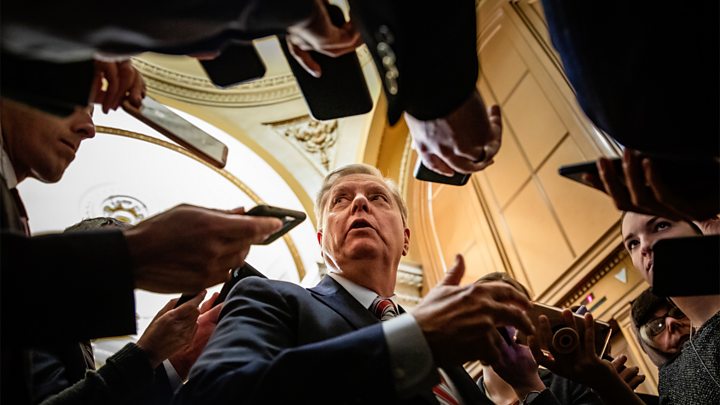Rep Jennifer Wexton D VA (10th District) is disgusted with the Senate vote denying the calling of witnesses to testify in (NOT MY) pres drumpf's / trump's impeachment trial, defying the opinion of 75% of the American people. Rep Wexton's votes for the articles of impeachment make her a target of the gop in the 2020 elections. We can not go back to being "represented" by the likes of that fascist fotze barbara comstock who voted with drumpf / trump-pence 97.8% of the time. Rep Wexton represents the values and interest of the people of the 10th congressional district voting with drumpf / trump-pence 4.5% of the time. This from Rep Wexton, click the links to go to her campaign website or to her congressional office.....
 |
I'm outraged by the GOP-led Senate's vote to block witnesses at Donald Trump's impeachment trial. It's clear that Mitch McConnell will move quickly now to end the trial and acquit the president.
The American people have been denied the opportunity to hear further testimony and evidence that would paint a damning picture of this administration's corrupt behavior and its attempts to subvert free and fair elections. We now need to make our outrage heard at the ballot box in November by voting against those who would further enable Donald Trump. Will you donate to help me keep fighting to protect the rule of law? Trump's team wants to make me a one-term congresswoman, and we need to be ready for all the smears and lies they'll throw our way. Thank you, Jennifer |
|
Yes, 75 percent of Americans support calling witnesses — but maybe not the same witnesses
Jan. 29, 2020 at 2:18 p.m. EST
This is a question of salience right now, given the emergence of reporting suggesting that former national security adviser John Bolton may have information strongly bolstering the case against the president. Trump, unsurprisingly, would rather that Bolton not present testimony to the senators who are empowered to remove the president from office. Senate Majority Leader Mitch McConnell (R-Ky.) is inclined to agree.
The implication of the poll for Trump’s opponents is clear: Americans want witnesses, so let Bolton in. That line of thought, though, misses two important points.
The first is that Congress has repeatedly shown a remarkable disinterest in responding to the majority will of the electorate when possible. Take the example of expanded background checks for gun sales: In the abstract, legislation to that end consistently has the support of a wide majority of the country. Often, though, possible legislative responses are simply set aside, allowing members of Congress to avoid having to weigh in against the will of the people. When legislation is introduced, specific proposals are often picked apart and attacked on the basis of particular elements of the legislation.
That, as it turns out, is probably a good analogy for the debate over impeachment trial witnesses. What a celebration of that 75 percent figure buries is that the witnesses sought by the 95 percent of Democrats who support the idea are almost certainly not the same witnesses supported by that plurality of Republicans.
Democrats want to hear Bolton and maybe acting White House chief of staff Mick Mulvaney. Republicans, however, want to see former vice president Joe Biden grilled, or even lead impeachment manager Rep. Adam B. Schiff (D-Calif.). Both sides support witnesses — but only in the abstract.
There’s evidence for that in other polling. Last week, CNN and its polling partner SSRS released a poll in which it found similarly high support for allowing witness testimony. This was before the Bolton news broke; at the time, about two-thirds of respondents supported allowing witnesses.
(CNN’s poll was conducted entirely before the Bolton news broke. Quinnipiac’s overlapped with the emergence of that news.)
However, CNN and SSRS asked a question that sheds more light on what respondents wanted to see. Specifically, they asked respondents if the push by Democrats to solicit new testimony was a function of their seeking a fair trail — or just because they wanted to hurt Republican chances in this year’s election.
Two-thirds of Republicans supported the latter view.
In other words, while about half of Republicans support witnesses, two-thirds think that the Democrats only want witnesses to hurt Republicans. Which strongly suggests that Republicans want to see witnesses who aren’t the ones the Democrats are advocating.
That said, it’s still the case that most Americans do want to see witnesses. A flat decision against calling witnesses runs contrary to that desire. As with background checks, though, the manifestation of that desire differs by party, complicating the politics. Both Democrats and Republicans should bear in mind that if witnesses are approved, neither side may be entirely happy with what they get.
Unlike background checks, though, the Senate won’t be able to avoid a vote.
Trump impeachment: Failed witnesses vote paves way for acquittal
US President Donald Trump is set to be acquitted in his impeachment trial after senators voted against calling witnesses or admitting new evidence.
1 February 2020
Democrats hoped four swing Republicans would vote for witnesses, which would have extended the trial without in all likelihood changing its outcome.
In the end, only two of the four Republicans voted with Democrats.
The trial now moves forward to a vote on whether to acquit President Trump, which he is all but certain to win.
Senior members of President Trump's Republican Party pushed from the outset for a speedy trial with no witnesses or new evidence. Above all, they wanted to avoid senators hearing from former National Security Adviser John Bolton.
According to reporting by the New York Times, Mr Bolton writes in his forthcoming book that the president directly instructed him to withhold military aid from Ukraine in exchange for dirt on a Democratic political rival, Joe Biden.
Testimony from Mr Bolton about his involvement in the Ukraine affair threatened to significantly undermine the case made by the president's lawyers during his trial.
Trump was impeached on two charges - abuse of power and obstruction of Congress. The first charge stemmed from an allegation that he pressured Ukraine to damage Mr Biden for his own political benefit. The second from an allegation that he purposefully obstructed the Congressional impeachment investigation.
The final vote on whether or not to acquit Mr Trump will be held on 5 February.
What happens next?
The Senate will vote on Wednesday 5 February on whether to convict or acquit the president on the two articles of impeachment brought against him.
Democratic Senate leader Chuck Schumer said there would be four votes on Friday night on Democratic amendments, followed by closing arguments on Monday, speeches from senators from Monday to Wednesday, and a final vote on Wednesday - the day after President Trump's State of the Union address.
A two-thirds majority in the chamber of 67 votes is required to remove him from office. The Republicans control the Senate with a 53-47 majority over Democrats, and no Republican senator has signalled that they plan to vote for Mr Trump's removal.
Eyes will instead fall on several Democrats in Republican-leaning states who have indicated they may vote to acquit. Any Democratic defections would be a symbolic victory for the president that he will likely use to his advantage on the campaign trail in the coming months.

The battle over witnesses intensified a week ago after reports emerged that Mr Bolton might have highly damaging testimony about the president's involvement an alleged quid pro quo with Ukraine.
Mr Bolton's forthcoming book reportedly alleges that the president personally directed the scheme to get dirt from Ukraine on Mr Biden, a former US vice president. The revelations threatened to undo Republican arguments that no impeachment witness had first-hand testimony of the president's involvement.
But the slim chance of Mr Bolton being called to give testimony to the Senate slipped away from Democrats on Friday, after two of the four Republican senators they had hoped would defect confirmed that they would not.
Senator Lamar Alexander of Tennessee said in a statement late on Thursday that, while the Democrats had clearly demonstrated the president's actions were "inappropriate", they had not proved to be impeachable offenses.
"The question then is not whether the president did it, but whether the United States Senate or the American people should decide what to do about what he did," he said.
"I believe that the constitution provides that the people should make that decision in the presidential election that begins in Iowa on Monday."
 GETTY IMAGES
GETTY IMAGES
Senator Lisa Murkowski of Alaska, another moderate, said in a statement on Friday afternoon: "The House chose to send articles of impeachment that are rushed and flawed. I carefully considered the need for additional witnesses and documents, to cure the shortcomings of its process, but ultimately decided that I will vote against considering motions to subpoena."
Republican senators Susan Collins of Maine and Mitt Romney of Utah decided to vote to call witnesses, but they were alone among the 53-strong Republican Senate caucus.
Democratic House impeachment managers said throughout the process that a trial without witnesses amounted to a sham trial. They were joined on Friday by President Trump's former White House chief of staff, John Kelly, who told a New Jersey publication that Mr Trump had been subjected to only "half a trial".

Donald Trump's Senate impeachment trial is all but over.
Barring an unforeseen and unexpected blockbuster development, a largely party-line vote will acquit him of the two charges brought by the House of Representatives, which itself approved those articles of impeachment on a nearly party-line vote.
Both sides will soon be left to sift through the political rubble just nine months before a national election that has the entire House, more than a third of the Senate and the presidency itself on the ballot.
According to polls, the nation's political disposition is much as it was before the impeachment process began. The US is sharply divided along partisan lines. The president's approval ratings hover in the low to mid-40s, roughly where they've been the entirety of his term in office. His re-election chances are dicey but far from slim.
The decision not to seek witnesses - which polls show Americans overwhelming wanted - may be forgotten before long.
Polls don't tell the whole story, however, and there are other signs that the impeachment proceedings have made an impact.

How did senators react?
Three of the four Democratic senators running for president tweeted in the moments after the witnesses vote went against the party.
"Senate Republicans just failed the American people & broke their oath to the United States Constitution," wrote Massachusetts senator Elizabeth Warren.
Vermont senator Bernie Sanders, an independent who caucuses with Democrats, wrote: "I've never heard of a trial where you don't have witnesses. This is a sad day in American history."
Senator Amy Klobuchar of Minnesota wrote: "If you don't have witnesses, you do not have a fair trial. The truth will come out."

Marco Rubio, Republican senator for Florida, said: "Just because actions meet a standard of impeachment does not mean it is in the best interest of the country to remove a President from office."







No comments:
Post a Comment